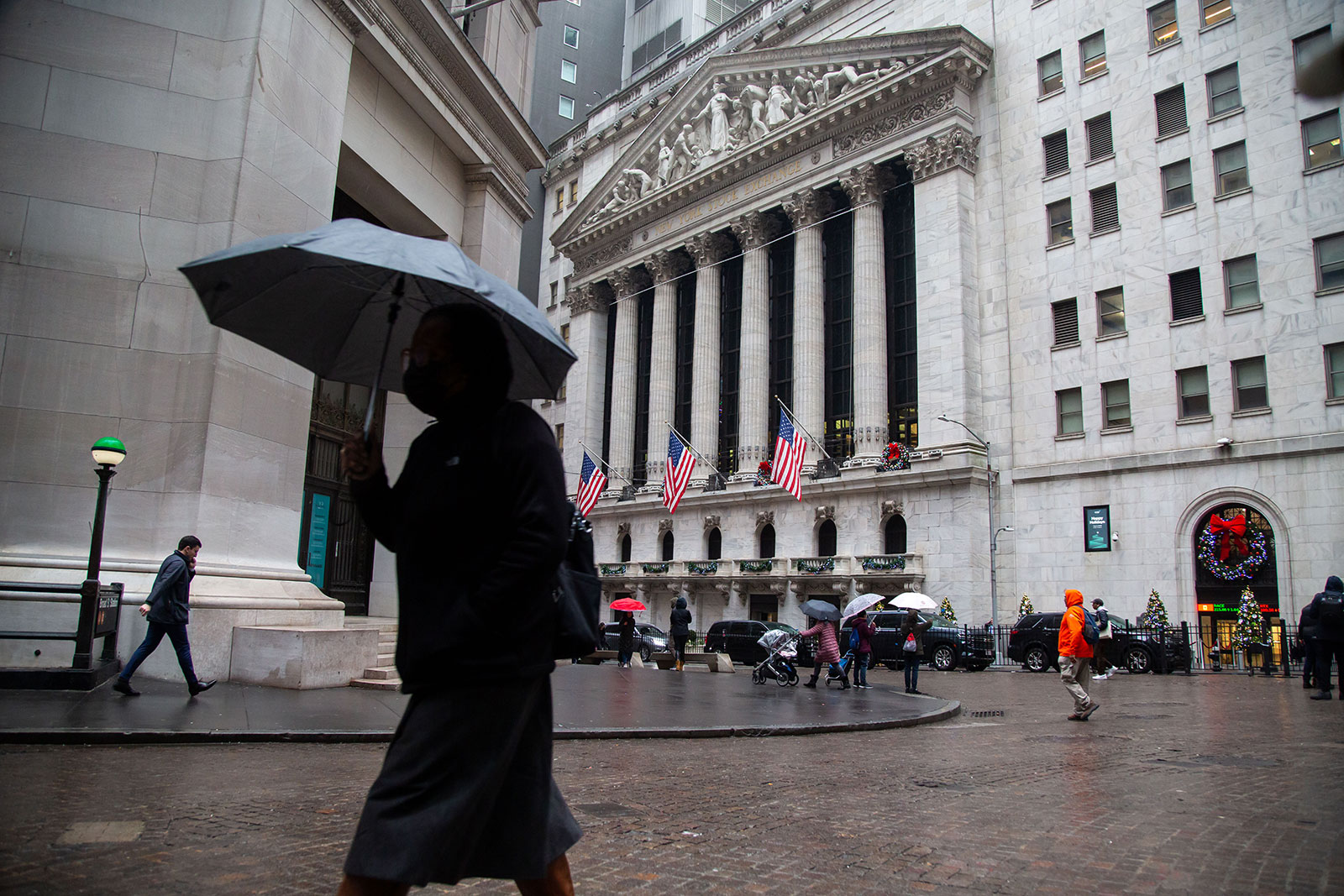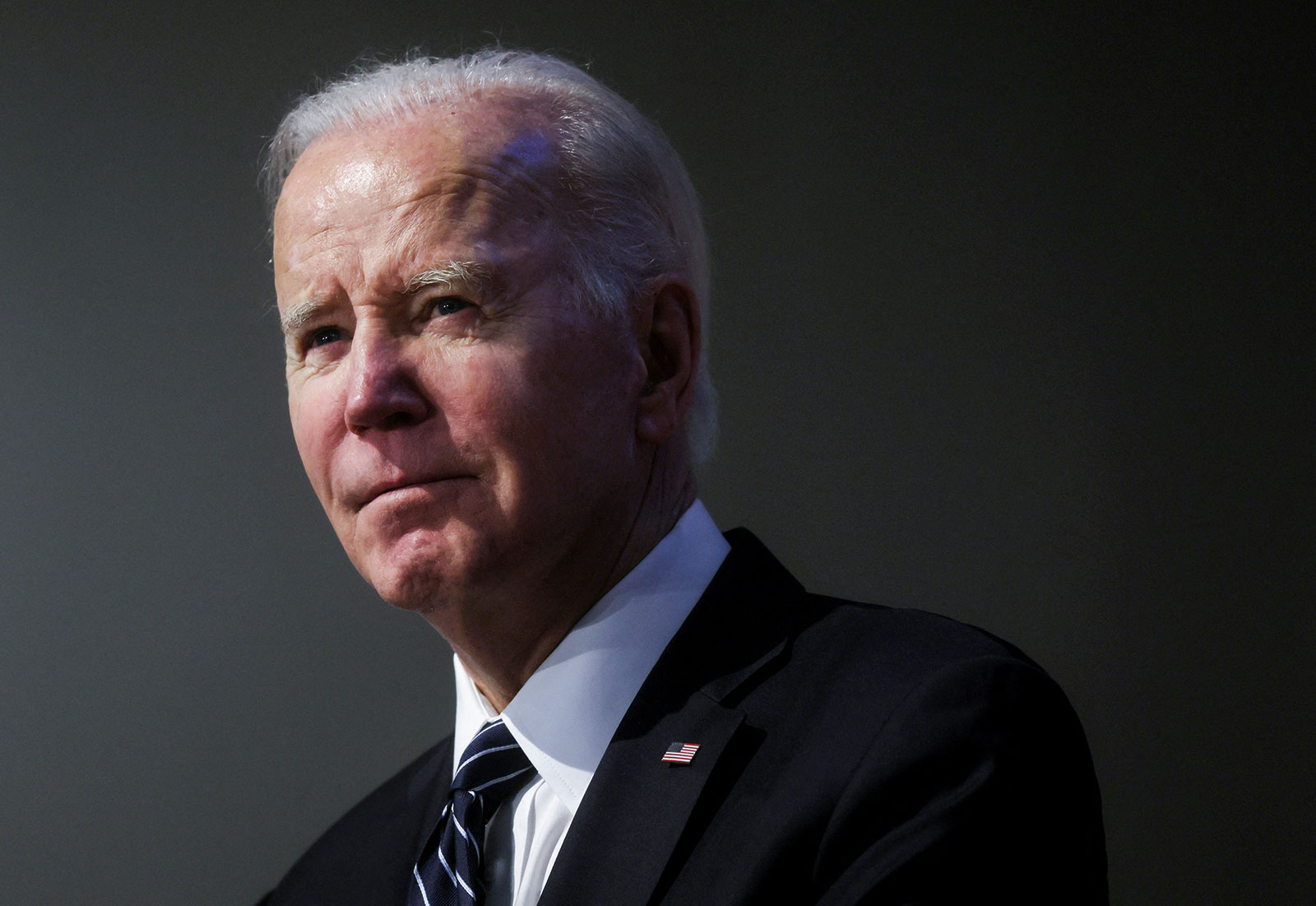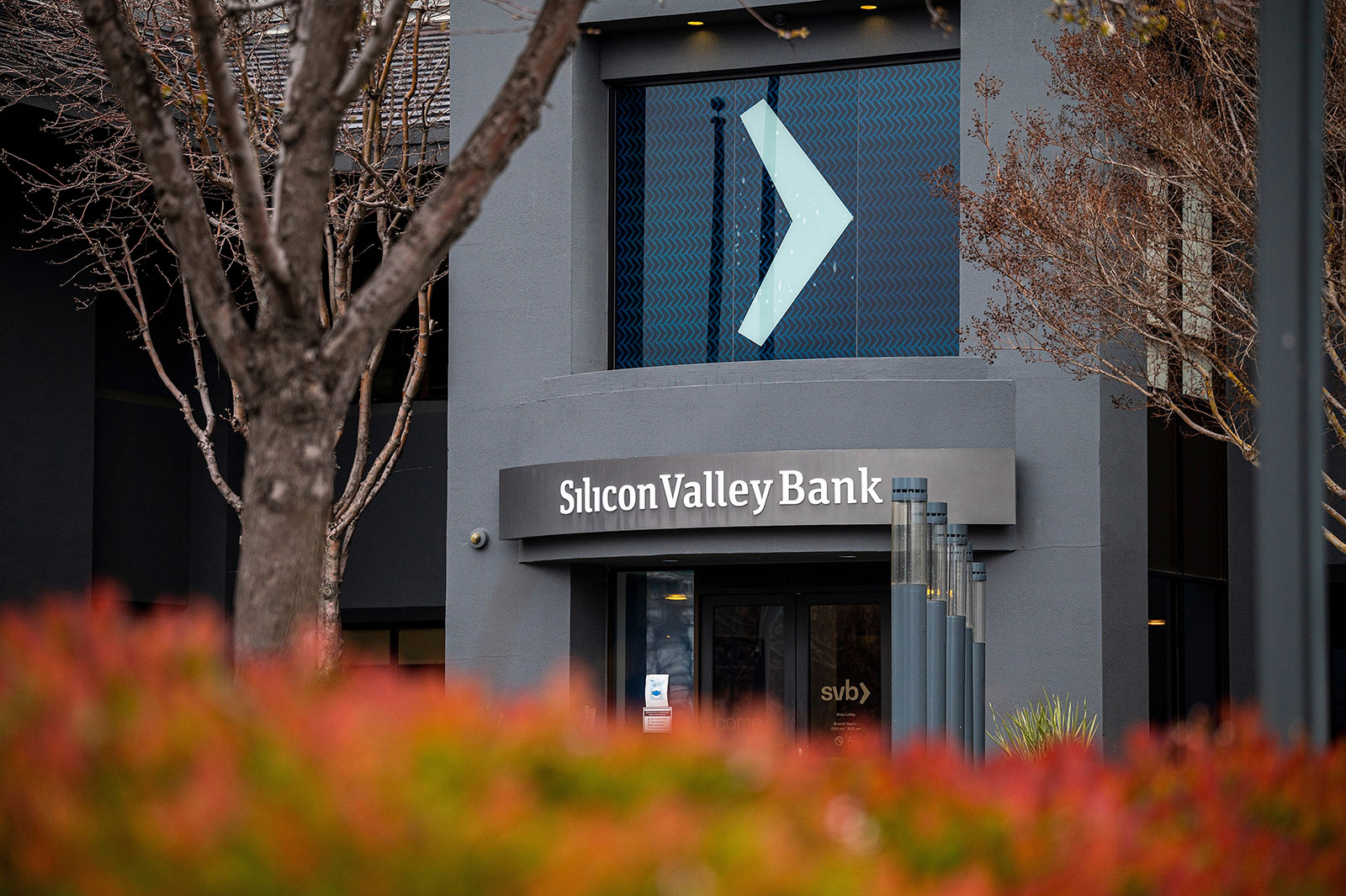
US and UK authorities are working to prevent wider financial chaos after Friday’s crisis — the biggest failure of a US bank since 2008

US banks are sitting on unrealized losses of $620 billion
From CNN’s Nicole Goodkind
Silicon Valley Bank’s collapse last week sent tingles of panic down investors’ spines as it highlighted a larger problem across the banking sector: The widening gap between the value large lenders place on the bonds they hold and what they’re actually worth on the market.
SVB’s downfall was tied, in part, to the plunge in the value of bonds it acquired during boom times, when it had a lot of customer deposits coming in and needed somewhere to park the cash.
But SVB isn’t the only institution with that issue. US banks were sitting on $620 billion in unrealized losses (assets that have decreased in price but haven’t been sold yet) at the end of 2022, according to the FDIC.
What’s happening: Back when interest rates were near zero, US banks scooped up lots of Treasuries and bonds. Now, as the Federal Reserve hikes rates to fight inflation, those bonds have declined in value.
When interest rates rise, newly issued bonds start paying higher rates to investors, which makes the older bonds with lower rates less attractive and less valuable.
The result is that most banks have some amount of unrealized losses on their books.
“The current interest rate environment has had dramatic effects on the profitability and risk profile of banks’ funding and investment strategies,” said FDIC Chairman Martin Gruenberg in prepared remarks at the Institute of International Bankers last week. “Unrealized losses weaken a bank’s future ability to meet unexpected liquidity needs.”
In other words, banks might find they have less cash on hand than they thought — especially when they need it — because their securities are worth less than they expected.
“Many institutions — from central banks, commercial banks and pension funds — sit on assets that are worth significantly less than reported in their financial statements,” said Jens Hagendorff, a finance professor at King’s College London. “The resulting losses will be large and need to be financed somehow. The scale of the problem is starting to cause concern.”
Still, there’s no need to panic yet, say analysts.
“[Falling bond prices are] only really a problem in a situation where your balance sheet is sinking quite quickly… [and you] have to sell assets that you wouldn’t ordinarily have to sell,” said Luc Plouvier, senior portfolio manager at Van Lanschot Kempen, a Dutch wealth management firm.
Most large US banks are in good financial condition and won’t find themselves in a situation where they’re forced to realize bond losses, said Gruenberg.
Shares of larger banks stabilized Friday after plunging to their worst day in nearly three years on Thursday.
CNN’s Julia Horowitz and Anna Coobin contributed to this post.
US will not bail out Silicon Valley Bank, Treasury secretary says
From CNN’s Sam Fossum, Ramishah Maruf, Alayna Treene, Phil Mattingly, Ted Barrett and Arlette Saenz
US Treasury Secretary Janet Yellen said earlier Sunday that the government wouldn’t bail out Silicon Valley Bank.
“Let me be clear that during the financial crisis, there were investors and owners of systemic large banks that were bailed out, and we’re certainly not looking,” Yellen told CBS News when asked if there will be a bailout. “And the reforms that have been put in place means that we’re not going to do that again.”
Yellen said she’d been hearing from depositors all weekend, many of whom are “small businesses” and employ thousands of people. “I’ve been working all weekend with our banking regulators to design appropriate policies to address this situation.”
A number of lawmakers are speaking out against the idea of a bailout.
- House Speaker Kevin McCarthy and Senate Majority Leader Chuck Schumer raised concerns about systemic failure in the economy.
- GOP Sen. Mitt Romney of Utah acknowledged the goal of avoiding panic when the markets open on Monday, but expressed concern about what would happen if the actions taken by federal regulators Sunday evening aren’t enough to stop further bank runs.
- South Carolina Sen. Tim Scott, ranking Republican on the Senate banking committee and a possible GOP presidential candidate, warned Sunday evening against “building a culture of government intervention,” saying it “does nothing to stop future institutions from relying on the government to swoop in after taking excessive risks.”
CNN’s David Goldman, Andrew Millman, Aileen Graef, Allison Morrow, Matt Egan, Manu Raju, Aaron Pellish and Jack Forrest contributed to this report.
US intervention in SVB collapse had mixed effect on stock markets around the world
From CNN’s Michelle Toh and Anna Cooban
Intervention by the US authorities to stem the fallout from Silicon Valley Bank’s collapse has done little to calm investors across the pond.
Stocks sank despite an announcement by HSBC (FTRXX) Monday that it had bought the UK arm of SVB for £1 ($1.2), saying the business’s customers could “continue to bank as usual” and that their deposits were safe.
Europe: Stocks ticked down in early morning trade as a selloff in bank stocks, which began Thursday, continued apace.
- Europe’s benchmark Euro Stoxx 600 (SXXL) dropped 2.5% Monday morning
- London’s FTSE 100 (UKX) lost 2.2%.
- The Stoxx Europe 600 Banks index, which tracks 42 big European banks, fell 5%, clocking its biggest fall since March 2021.
- The FTSE-listed bank’s stock fell 3.5% in European trade.
Asia: Asia-Pacific stocks were mixed as investors digested news of the US regulatory efforts.
- Japan’s benchmark Nikkei (N225) index closed 1.1% down.
- South Korea’s Kospi (KOSPI) initially fell in morning trade, before reversing course to stand 0.7% higher.
- In Australia, the S&P/ASX 200 ended 0.5% lower.
- In Hong Kong, the Hang Seng Index (HSI) closed up 2%.
- Shanghai Composite (SHCOMP) was 1.2% higher.
- Standard Chartered (SCBFF), which is headquartered in London but makes most of its money in Asia, dropped 0.6% in Hong Kong.
- Singapore’s DBS, Southeast Asia’s largest lender, dipped 0.8%.
US futures holding steady after Fed moves to restore confidence in banking system
From CNN’s Michelle Toh and Anna Cooban

US stock futures were holding steady Monday after an extraordinary move by US financial regulators to restore confidence in the country’s banking system.
- S&P 500 futures gave up their overnight gains to trade flat.
- Nasdaq futures were 0.32% higher Monday morning.
- Dow futures, which rose in early morning trade, fell back 0.28%.
On Sunday, the Biden administration promised that customers of the failed Silicon Valley Bank (SVB) and Signature Bank would have access to all their money starting Monday. The US Federal Reserve will also make additional funding available for eligible financial institutions to prevent runs on similar banks in the future.
Investors around the world visibly exhaled after the announcement, according to Stephen Innes, managing partner of SPI Asset Management, who likened it to “the calvary” coming to the rescue.
Biden will address Silicon Valley Bank collapse at 8 a.m. ET
From CNN’s Sam Fossum and Aaron Pellish

President Joe Biden said he will address the developing situation in the US banking system on Monday morning.
“Yes. I’ll talk to you tomorrow morning,” he told reporters in response to a question about addressing the situation as he boarded Air Force One to return to the White House.
Later, the White House released a daily guidance for Monday, noting that Biden is scheduled to make remarks on the banking system at 8 a.m. ET before departing for San Diego where he is scheduled to meet the prime ministers of the United Kingdom and Australia.
Analysis: Here’s why the Silicon Valley Bank collapse is different from 2008
Analysis by CNN’s Julia Horowitz and Anna Cooban
The failure of Silicon Valley Bank is rattling markets and raising uncomfortable questions: Will it undermine the broader banking system and start a new meltdown?
Most analysts say the implosion of SVB appears company-specific for now. A crucial lender to US technology startups, the bank came under pressure as Silicon Valley funding dried up, the result of an economic slowdown and rapidly rising interest rates.
“The reason [SVB is] in trouble is because they have exposure to particular industries,” said Jonas Goltermann, deputy chief markets economist at Capital Economics. Most other banks, he added, are more “diversified.”
After Treasury Secretary Janet Yellen convened an unscheduled meeting of financial regulators to discuss SVB’s collapse, Deputy Treasury Secretary Wally Adeyemo on Friday sought to reassure the public about the health of the banking system after the sudden collapse of SVB.
“Federal regulators are paying attention to this particular financial institution and when we think about the broader financial system, we’re very confident in the ability and the resilience of the system,” Adeyemo told CNN in an exclusive interview. “We have the tools that are necessary to [deal with] incidents like what’s happened to Silicon Valley Bank.”
There’s also less anxiety about the stability of the banking sector due to the significant regulatory reforms put in place after the crisis in 2008.
Mike Mayo, senior bank analyst at Wells Fargo, said the crisis at SVB might be “an idiosyncratic situation.”
“This is night and day versus the global financial crisis from 15 years ago,” he told CNN on Friday. Back then, he said, “banks were taking excessive risks, and people thought everything was fine. Now everyone’s concerned, but underneath the surface the banks are more resilient than they’ve been in a generation.”
Still, SVB’s collapse reveals stresses created by the fastest jump in borrowing costs in decades. Central banks have raised interest rates to tame high inflation, but the pace of the increases has thrown up unexpected problems. And worries persist about further unintended consequences.
CNN’s Allison Morrow, Nicole Goodkind and Matt Egan contributed to this post.
Silicon Valley Bank employees received bonuses hours before bank shutdown, reports say
From CNN’s Ramishah Maruf

The US Federal Deposit Insurance Corporation offered Silicon Valley Bank employees 45 days of employment and 1.5 times their salary, reports say.
An FDIC official did not comment on the details to CNN, but said it is standard practice and one of the first steps the independent government agency takes after being named receiver.
US workers also received their annual bonuses on Friday, just hours before FDIC took over the collapsed lender, Axios reported.
SVB collapsed Friday morning — a stunning 48 hours where a bank run and a capital crisis led to the second-largest failure of a financial institution in US history. California regulators shuttered the tech lender and put it under the control of the FDIC.
The FDIC is acting as a receiver, which typically means it will liquidate the bank’s assets to pay back its customers, including depositors and creditors.
Employees, except essential and branch workers, were told to keep working remotely, Reuters reported. The bank had more than 8,500 employees at the end of 2022.
The FDIC said the main office and all 17 branches of SVB, located in California and Massachusetts, will reopen Monday.
The FDIC, an independent government agency that insures bank deposits and oversees financial institutions, said all insured depositors will have full access to their insured deposits by no later than Monday morning. It said it would pay uninsured depositors an “advance dividend within the next week.”
The FDIC took over in the midmorning Friday; usually, it waits until markets close.
“SVB’s condition deteriorated so quickly that it couldn’t last just five more hours,” wrote Better Markets CEO Dennis M. Kelleher. “That’s because its depositors were withdrawing their money so fast that the bank was insolvent, and an intraday closure was unavoidable due to a classic bank run.”
CNN’s Allison Morrow contributed to this story.
Biden promises to hold those responsible for Silicon Valley Bank collapse “fully accountable”
From CNN’s Sam Fossum, Ramishah Maruf, Alayna Treene, Phil Mattingly, Ted Barrett and Arlette Saenz
US President Joe Biden said Sunday that at his direction US Treasury Secretary Janet Yellen and his top economic adviser Lael Brainard worked with financial regulators to ensure households and businesses affected by the Silicon Valley Bank and Signature Bank failures could access their deposits, and he promised to hold those responsible accountable.
“I am pleased that they reached a prompt solution that protects American workers and small businesses, and keeps our financial system safe. The solution also ensures that taxpayer dollars are not put at risk,” Biden said in the statement.
“I am firmly committed to holding those responsible for this mess fully accountable and to continuing our efforts to strengthen oversight and regulation of larger banks so that we are not in this position again,” he added.
Biden plans to make remarks Monday on maintaining a “resilient banking system.”
The administration decided to move forward with dramatic emergency actions Sunday to extend a federal backstop to all of Silicon Valley Bank’s deposits in order to ensure access to all of those funds on Monday, according to a senior Treasury official.
The emergency action was paired with the announcement of a new Federal Reserve lending facility and put together over a weekend of furious behind-the-scenes efforts inside the US government to address the acute concern over the fate of the small businesses and individuals at risk of being unable to access their funds.
Earlier, the FDIC said it would pay customers their insured deposits on Monday, which only covers up to $250,000. But the Treasury official noted that “things moved very quickly” over the weekend and that the decision was made to “move early” and trigger the systemic risk exception – a designation that provides more leeway to immediately advance funds to those holding deposits above the current $250,000 threshold covered by FDIC.
Yellen on Sunday instructed the Federal Deposit Insurance Corporation to guarantee SVB customers will have access to all of their money starting Monday – an attempt to ensure public confidence in America’s banking system, Yellen, Federal Reserve Chair Jerome Powell and FDIC Chairman Martin J. Gruenberg said in a joint statement.
Yellen said earlier Sunday the government wouldn’t bail out the bank, with a number of lawmakers speaking out against such an idea.
“Let me be clear that during the financial crisis, there were investors and owners of systemic large banks that were bailed out, and we’re certainly not looking,” Yellen told CBS News when asked if there will be a bailout. “And the reforms that have been put in place means that we’re not going to do that again.”
Yellen said she’d been hearing from depositors all weekend, many of whom are “small businesses” and employ thousands of people. “I’ve been working all weekend with our banking regulators to design appropriate policies to address this situation,” the Treasury secretary said, declining to provide further details.
CNN’s David Goldman, Andrew Millman, Aileen Graef, Allison Morrow, Matt Egan, Manu Raju, Aaron Pellish and Jack Forrest contributed to this report.
Chinese companies and founders rush to calm investors after Silicon Valley Bank’s collapse
From CNN’s Laura He
The collapse of Silicon Valley Bank (SVB), which courted Chinese start-ups, has caused widespread concern in China, where a string of founders and companies rushed to appease investors by saying their exposure was insignificant or nonexistent.
SVB, which worked with nearly half of all venture-backed tech and healthcare companies in the United States before it was taken over by the government, has a Chinese joint venture, which was set up in 2012 and targeted the country’s tech elite.
The SPD Silicon Valley Bank, which was 50-50 owned by SVB and local partner Shanghai Pudong Development Bank, said Saturday that its operations were “sound.”
It’s unclear what will happen to SVB’s ownership of the joint venture.
SVB Financial Group, the parent company of SVB, also has two business consulting firms and one financial service firm in mainland China, according to the corporate database Tianyancha.
Concerns about the failure of SVB have spread around the world, as investors fretted about the broader risks to the global banking sector and any potential spillover effect.
Not significant exposure
In China, at least a dozen firms have issued statements since SVB collapsed trying to pacify investors or clients, saying that their exposure to the lender was limited. Most were biotech companies.
BeiGene, one of China’s largest cancer-focused drug companies, said Monday it had more than $175 million uninsured cash deposits at SVB, which represents approximately 3.9% of its cash, cash equivalents and short-term investments.
Other companies that publicly assured investors included Zai Lab, Andon Health, Sirnaomics, Everest Medicines, Broncus Medical, Jacobio Pharmaceuticals, Brii Biosciences, CStone Pharmaceuticals, Genor Biopharma and CANbridge Pharmaceuticals.
Mobile ad tech firm Mobvista and wealth management firm Noah Holdings said their cash holdings at SVB were “minimal” or “immaterial.”
Popular selfie app Meitu said it hadn’t held any bank accounts at SVB since 2020. It issued a statement “to avoid any potential public misunderstanding.”
Source: https://www.cnn.com/business/live-news/silicon-valley-bank-collapse-updates-03-13-23/index.html


















